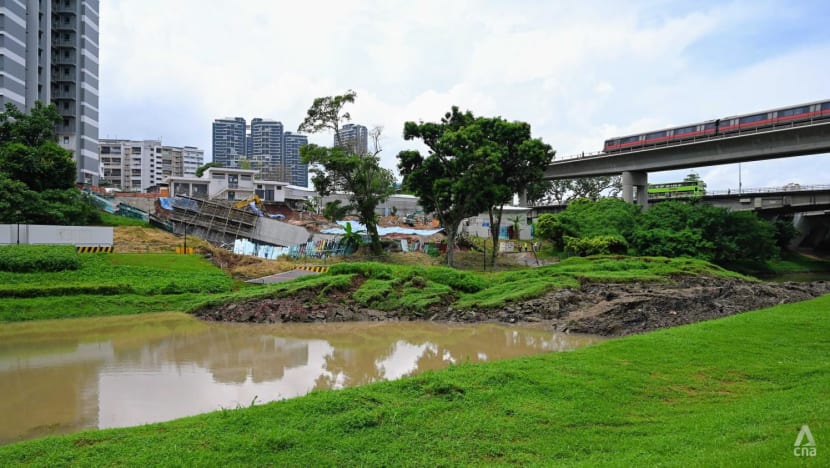More landslides reported in 2020, 2021 amid higher-than-normal rainfall: Desmond Lee

SINGAPORE: More landslides were reported over the last two years compared to previous years, possibly due to higher-than-normal rainfall, Minister for National Development Desmond Lee said on Monday (Oct 3) in response to a parliamentary question.
An average of 21 landslides were reported per year in 2020 and 2021.
This is higher than the average of four such incidents reported to the Building and Construction Authority (BCA) each year between 2017 and 2019.
"These were all relatively minor cases involving the movement of shallow layers of soil, and did not cause significant damage to infrastructure," Mr Lee said in a written answer to questions from Member of Parliament He Ting Ru (WP-Sengkang).
"Higher-than-normal rainfall was recorded in 2020 and 2021, which could be one factor that contributed to the higher number of incidents in these two years."
For this year, one landslide has been reported to BCA so far - the incident at the Clementi NorthArc Build-to-Order construction site on Sep 2.
"This was caused by slope failure, which refers to the sudden collapse of a slope due to changes in soil strength or the destabilisation of the slope," Mr Lee said.
"BCA has inspected the surrounding buildings and found them to be structurally sound. The cause of this incident is currently being investigated."
Ms He had asked about the number of landslides reported in the preceding five years, how often and under what circumstances the stability of land close to building or deforestation sites is reviewed and assessed, and if any update is required to the monitoring and rectification regime for landslides.
Noting that the movement of soil can be triggered by factors such as heavy and prolonged rainfall, additional loads on slopes and changes to slope profiles due to construction work, Mr Lee outlined the current framework in place to prevent landslides.
"Agencies that manage public land carry out regular inspections on slopes that may pose a risk to public safety, and implement appropriate mitigation measures to stabilise the slopes as needed," he said.
"Our agencies may also conduct inspections more frequently, such as on a weekly or monthly basis, during periods of intense wet weather."
BCA also requires all slopes that are formed or modified by building works to be assessed for risk of failure by a qualified person (QP) before construction commences, he added.
"The QP is required to recommend slope protection measures to be put in place, such as earth retaining walls and stabilising structures, to ensure that the slope remains stable under adverse weather conditions, including extreme rainfall," Mr Lee said.
"The QP is also required to recommend measures to monitor the condition of the slope while works are ongoing.
"The frequency of monitoring may vary depending on the complexity of the works. For example, slopes may be monitored twice a week for relatively shallow excavation works, and daily for works in close proximity to other buildings."
As a precautionary measure following the Sep 2 slope failure incident, BCA reminded qualified persons and builders to inspect slopes on or adjacent to construction sites, and to take additional measures as needed to ensure that these slopes remain stable, Mr Lee said.
"BCA also issues regular advisories to remind land and building owners to implement measures to manage the risk of landslides for their slopes," he added.
"These include ensuring adequate drainage and proper maintenance of slope- and earth-retaining structures."
He added that BCA will review the cause of the Sep 2 landslide after investigations have been completed, and assess if additional measures are required to ensure the safety of slopes on or near construction sites.
The landslide last month injured one passer-by, caused "soil displacement" into Sungei Ulu Pandan and damaged part of the Ulu Pandan park connector.
Parts of the park connector were closed temporarily following the incident, and a channel had to be created to allow water to flow through the affected section of the canal.















